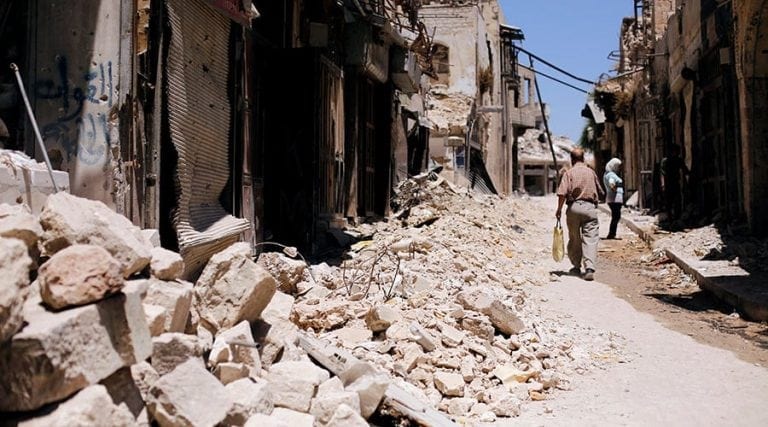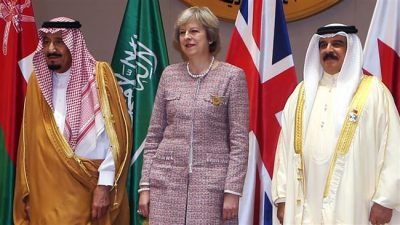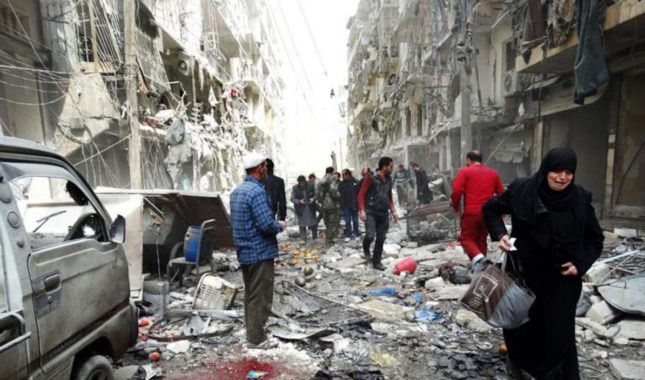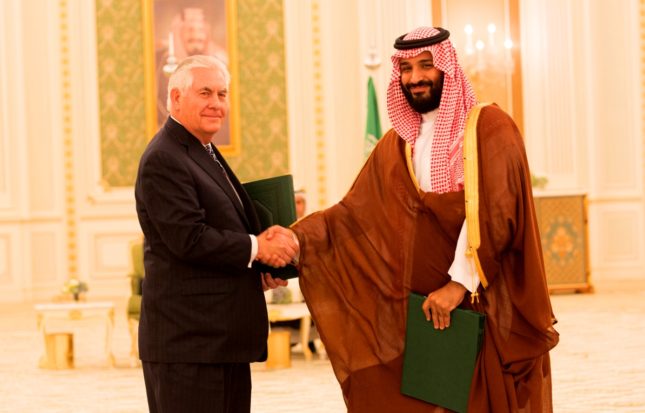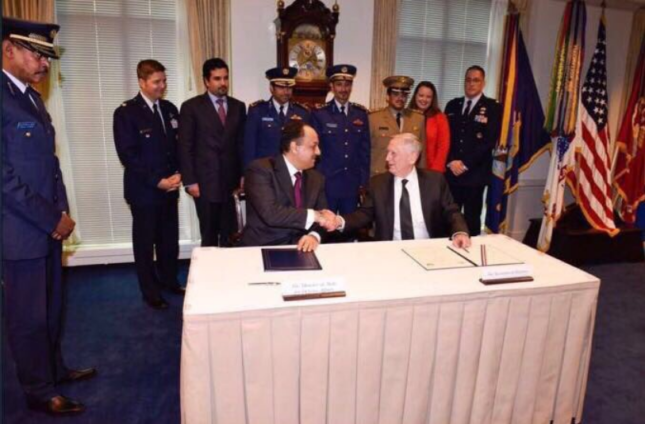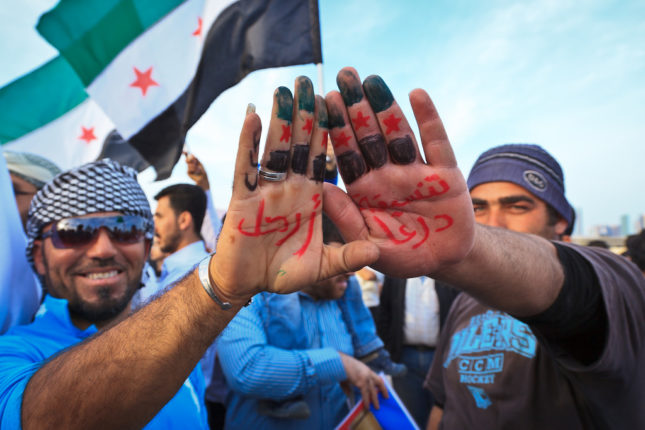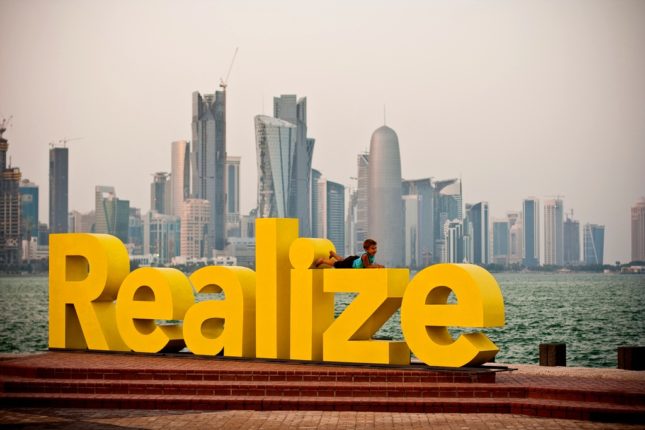The manipulation of news and the distortion of reality are the most powerful weapons in the hands of power. They can make a whole reality disappear.
Yemen’s, for example.
A child dies in Yemen every ten minutes from preventable causes, UNICEF reported in June. These deaths are only part of a humanitarian catastrophe, among the worst in the world, including a rampaging cholera epidemic, to which the witness of the overwhelming majority of the West’s warmongering Goebbelist media pretends to be deaf, mute, and blind.
Nevertheless, information is accessible. There are sporadic exceptions to the conspiracy of silence in officialdom and the media. The week of July 10, The Independent published in the “Voices” section the appeal of Wael Ibrahim, an aid worker in Yemen:
“It is going to take years to restore any infrastructure like health services, and rewire the city [Sana’a] for electricity. We need more people to talk about Yemen.”
Saudi Arabia, backed by the US and Britain, began bombing Yemen, the poorest country in the region, on 23 March 2015—without a Security Council resolution, as has been the tradition for launching western wars since Bill Clinton’s 1999 Kosovo War (the bombing of Serbia).
The stated objective of the Anglo-American backing of the Saudi attack was the restoration of Yemen’s US-supported government of President Abdrabbuh Mansour Hadi’s, which fled to Saudi Arabia under the mounting pressure of the Houthi Shia rebels, accused by the United States of being pawns of Iran, or, dismissively, plain Iran-supported.
Boggles the mind to think of the blithe moral logic that justifies the support of the United States for a (largely faked) uprising in Syria when Iran is not allowed to assist Houthis in Yemen, fighting an authentic civil war, unlike the so-called Free Syrian Army and their hordes of 80% foreign al-Qaeda and Isis allied invaders of Syria’s sovereign state in 2011.
The hypocrisy of empire, one supposes: supporting rebels in one case and the legitimate government in another.
For this reason—Iran’s backing—the Saudis blockade the air and the ports of Yemen to check the flow of Iranian arms shipments to the rebels, adding to the infamy of the war the infamy of an economic siege—infamy because the largest number of victims in this tactic to encircle Iran are civilians, which is another tradition respected by the sorry, deceptive War on Terror.
The blockade also checks the “flow” of food and medicines and other health necessities, with devastating consequences, as we shall see.
Few honest observers doubt that the war in Yemen, instigated by the Obama administration and their British junior partners in the Cameron cabinet, is a war of strategy in which the real target is Iran. As in Iraq in 2003, the British partnership is invaluable because of its long experience in the “management” of former colonies the likes of Iraq and Yemen, when the port of Aden was a central and crucial traffic point in the business of running the British empire, which consisted of two thirds of the planet.
Claiming that Iran destabilizes the region, against the evidence of a chronic history of interference and aggressions there by the US & Co., Trump’s national security advisor asserted in a statement in January: “As of today, we are putting Iran on notice.” Yemen, thus, is the unfortunate country inconveniently placed by geography between Iran and Western objectives, bombed, economically besieged, its currency in collapse—the war tactics of the feudal Middle Ages.
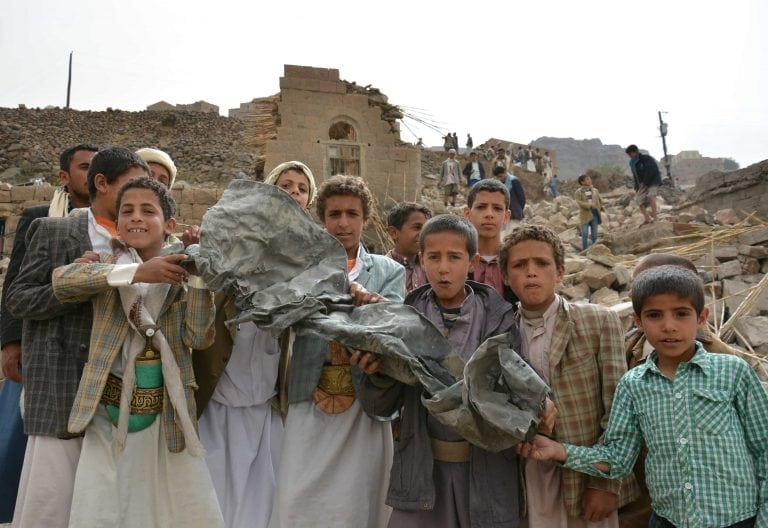
In a file photo, Yemeni boys hold a large piece of twisted metal near homes that were destroyed in an air strike, in Okash Village, near Sanaa, the capital. The cowardly Saudis, supported by the West, enjoy complete air supremacy, that is criminality with impunity.
Since March 2015, 3.2 million Yemenis have been displaced; 13,000 civilians have been casualties (UN official count); 2 million children cannot attend schools; nearly 15 million people have no access to basic medical care.
Last October, a Saudi bomb struck a funeral in Sana’a, killing 114 people (in some reports, 140) and injuring 613 out of 750 mourners in just one such civilian massacre of many—including in marketplaces and refugee camps—prompting United Nations experts to say the Saudis had violated international law, among other reasons because they attacked twice, while the funeral hall was still littered with wounded from the first attack, killing the wounded and first responders. In March, a Saudi airstrike killed 40 Somali refugees in a boat, fleeing the war torn country; more recently a market on the Saudi border was struck, killing six children.
Saudi airstrikes have destroyed schools, hospitals, and vital infrastructures such as electric grids and water supplies all classic crimes against humanity and war crimes.

Saudi autocrat bin Salman is at the helm of the genocidal war against Yemen. In the final analysis, Western "democracies" can always claim that it was the Arabs themselves who lynched Yemen.
King Salman Humanitarian Aid and Relief Centre (KS Relief), founded by the lately departed King Salman bin Abdulaziz al-Saud in 2015, claims categorically that Saudi Arabia “has no intention of killing civilians.” Instead, they intend to “regain the will of the Yemeni people, taken by force” by Houthi rebels.
KS Relief has hired a British PR firm to spread good tidings about Saudi humanitarian assistance to Yemen: “We’re here to help.” Indeed, KS Relief has allocated more than $3 billion for assistance to Yemen: “number one donor for aid and development in Yemen,” KS Relief boasts. But, though they deny it, the aid is distributed through various filters, including UN agencies, with secret restrictions as to whom, where, and when. At any rate the campaign for “hearts and minds” in Yemen, sounds as grotesque as its erstwhile precedent in the American war in Vietnam: bomb first, then supply a bandage.
Andrew Smith, for the British Campaign Against Arms Trade (CAAT), told The Independent, a propos Saudi aid to Yemen,
“Any aid that is helping people is to be welcomed, but the best thing that the Saudi regime can do for the people of Yemen is to stop the brutal bombing campaign that has killed thousands and brought millions to the edge of starvation.”
Out of 27 million people in Yemen, 20 million are food-insecure, famished in other words. Wael Ibrahim refers to statistics released by UN and other agencies:
“As the conflict goes on I’m seeing more and more poverty. There are 20 million people needing help in a population of 27 million people. I’ve seen famine-like conditions such as children with red streaks in their hair – a sign of malnutrition, and an alarming number of people at therapeutic feeding centres.”
Yet, we hear hardly a whimper of protest against this immense suffering among that portion of the American public—the radical left included– which so exercises the vocal cords on behalf of human rights when and where alleged violations coincide with Western intentions of regime change and occupation.
It is puzzling indeed why officials are not instructing the media to manufacture consent for a crusade of human rights in Yemen as they did for Libya and Syria to cover their real intentions. Can they not find a “demon” to raise righteous indignation? An ethnic group, whose human rights are hideously violated by the “demon”? Why is the war in Yemen such a low-profile conflict?
Pardon my cynicism, but the absence of instrumental justification feels like a ghost that refuses to do the job of haunting. Possibly, something too embarrassing could become public knowledge. Possibly a lucrative alliance could suffer.
Possibly.
The American and British weapons industry profit from the war in Yemen—as do, no doubt, all the members of the NATO alliance and beyond. The Obama administration sold on the world’s weapons market $200 billion worth of arms over eight years, the largest US weapons sale since WW II–over $100 billion to Saudi Arabia alone. The Trump administration has also distinguished itself for a vulgar display of fetishistic attachment to the kingdom of satraps. In June, the US Senate approved (53 for; 47 against) Trump’s April arms sale of $110 billion to Riyadh: $500 million in precision-guided munitions.
Britain’s war industries thrive on the suffering of Yemen. British Campaign Against Arms Trade (CAAT) reported in The Independent in July:
“The UK has licensed £3.3 bn worth of weapons to Saudi Arabia. Right now, UK made fighter jets are being flown by UK-trained military personnel and dropping UK-made bombs on Yemen. The UK is not just a bystander in this war, it is an active participant.”
“Partners in crimes” would me more accurate: as mentioned, the British government is training the Saudi Air Force for airstrikes in Yemen, at the same time that Theresa May is withholding a report-study of Riyadh’s “ties to extremism.” The Saudi pilots are being trained to drop cluster bombs, “precisely” in theory, made in and sold by Britain. Cluster bombs are WMDs if used on civilian centers. They are allowed only for maiming and killing enemy soldiers. The beauty of recent wars is that “army” has become a nebulous concept. So, anything goes.
In the last few days, the British High Court has denied a request by CAAT, calling for the government’s suspension of arms sales to Saudi Arabia for use in Yemen, “pending the [judicial] review into if the sales are compatible with UK and EU arms export law,” as Andrew Smith wrote for CAAT in The Independent, following the denial.
Apparently the arms and military equipment sales to Saudi Arabia–aircraft, helicopter, drones, cluster bombs, and missiles–DO violate the laws of Britain and European Union, otherwise why would the court reject the request for a Judicial Review of the government’s practice?
Such is the absent zeal of western institution for protection of human rights that we should remember this infamous decision when next we are being seduced by the bloodhounds in the media into supporting the faux-crusades for random and selective human rights in the world by heartless and mercenary paladins.
To be fair, two thirds of the British public opposes arms sales to Saudi Arabia. Jeremy Corbyn agrees with the majority, calling the petro-monarchy’s intervention in Yemen “an invasion,” in an interview with Al Jezeera English.
While the crimes in Yemen are being assiduously ignored by the media and covertly aided by governments, their effects are accumulating. An outbreak of cholera is claiming more lives. One person per hour is dying of the water-borne disease. Wael Ibrahim laments in his Independent piece:
“These are the appalling conditions that caused the cholera outbreak in Yemen – I should know, I live here. There is untreated sewage on the streets of Sana’a. Driving near the airport I simply cannot breathe because of the stench.”
This situation carries the horrifying echo of what happened in Iraq in the 1990s, under the sanction regime inflicted by the senior Bush and continued by Bill Clinton, for a total of thirteen years. After bombing Iraq’s water-supply installations during the Gulf War, the US effectively (and possibly deliberately) poisoned the water by sanctioning the importation of purifying chlorine. As is notorious by now, 500,000 children under the age of five perished. Clinton’s ghoulish Secretary of State, Madeleine Albright, admitted on CBS that such deaths had been “worth it.” The sanctions on Iraq had been pronounced on an August 6th, the month and day of the nuclear bombing of Hiroshima in 1945. Many noted this sadistic coincidence, denouncing the sanctions as a second Hiroshima bomb—this time dropped on Iraq.
The cholera infection, marked by violent diarrhea, is caused by ingestion of water contaminated by fecal matter. The outbreak in Yemen first manifested itself in October 2016, but between April and June of 2017, it became rampant. According to the United Nations’ World Health Organization, 300,000 Yemenis are already infected. 1,500 people have died, 55% of them children. Hospitals are full with patients showing symptoms. Clean water, sanitation, and healthcare—the means to check the epidemic—are woefully scarce.
And no one yet asks, “Is it/was it worth it?” Perhaps the question will come up later, when counting the dead will do no harm to the progress of that virtual crime, officially known as the “foreign policy” of the United States in the “Middle East,” an abstract map to the planners—not a territory within which people live and will suffer from the plans.
Me? Oh, I turn to literature when speechless at the horror of it all. Who better than Sartre? Without ellipsis, synthesized, from the long passage in his first novel, Nausea:
“The nausea is not within me. I feel it out there. I am within it. I feel it out there in the wall, in the suspenders, everywhere around me. A monster? A giant carapace? Sunk in the mud? A dozen pairs of claws or fins laboring slowly in the slime? The monster rises. At the bottom of the water.”
Sources
Wael Ibrahim’s report on cholera in Yemen
http://www.independent.co.uk/author/wael-ibrahim
Britain training Saudi pilots
http://www.independent.co.uk/news/uk/politics/saudi-arabia-yemen-conflict-bombing-latest-uk-training-pilots-alleged-war-crimes-a7375551.html
US Senate Backs Trump’s Weapon Sale to Saudi Arabia
https://www.nytimes.com/2017/06/13/world/middleeast/trump-weapons-saudi-arabia.html?rref=collection%2Ftimestopic%2FSaudi%20Arabia&action=click&contentCollection=world®ion=stream&module=stream_unit&version=latest&contentPlacement=25&pgtype=collection
Life Beneath Bombs and Blockade
https://www.nytimes.com/2017/06/27/opinion/yemen-houthis.html?rref=collection%2Ftimestopic%2FSaudi%20Arabia&action=click&contentCollection=world®ion=stream&module=stream_unit&version=latest&contentPlacement=2&pgtype=collection
Cholera Epidemic in Yemen
http://www.independent.co.uk/news/world/middle-east/yemen-war-deaths-cholera-epidemic-dying-every-hour-a7782341.html
Britain’s High Court Decision on Arms Sales to Saudi Arabiahttp://www.independent.co.uk/voices/saudi-arabia-yemen-campaign-against-the-arms-trade-lost-case-a7833766.html
Trump’s Weapons’ Sale to Saudi Arabia
https://www.nytimes.com/2017/06/13/world/middleeast/trump-weapons-saudi-arabia.html
Jeremy Corbyn’s Stand on Arms Sales to Saudi Arabia
http://www.independent.co.uk/news/uk/politics/jeremy-corbyn-saudi-arabia-arms-sales-yemen-famine-civilian-killed-a7818481.html
 In his zeal to prove to his antagonists in the War Party that he is as bloodthirsty as their champion, Hillary Clinton, and more manly than Barack Obama, Trump seems to have gone “play-crazy” -- acting like an unpredictable maniac in order to terrorize the Russians into forcing some kind of dramatic concessions from their Syrian allies, or risk Armageddon.However, the “play-crazy” gambit can only work when the leader is, in real life, a disciplined and intelligent actor, who knows precisely what actual boundaries must not be crossed. That ain’t Donald Trump -- a pitifully shallow and ill-disciplined man, emotionally handicapped by obscene privilege and cognitively crippled by white American chauvinism. By pushing Trump into a corner and demanding that he display his most bellicose self, or be ceaselessly mocked as a “puppet” and minion of Russia, a lesser power, the War Party and its media and clandestine services have created a perfect storm of mayhem that may consume us all.— Glen Ford, Editor in Chief, Black Agenda Report
In his zeal to prove to his antagonists in the War Party that he is as bloodthirsty as their champion, Hillary Clinton, and more manly than Barack Obama, Trump seems to have gone “play-crazy” -- acting like an unpredictable maniac in order to terrorize the Russians into forcing some kind of dramatic concessions from their Syrian allies, or risk Armageddon.However, the “play-crazy” gambit can only work when the leader is, in real life, a disciplined and intelligent actor, who knows precisely what actual boundaries must not be crossed. That ain’t Donald Trump -- a pitifully shallow and ill-disciplined man, emotionally handicapped by obscene privilege and cognitively crippled by white American chauvinism. By pushing Trump into a corner and demanding that he display his most bellicose self, or be ceaselessly mocked as a “puppet” and minion of Russia, a lesser power, the War Party and its media and clandestine services have created a perfect storm of mayhem that may consume us all.— Glen Ford, Editor in Chief, Black Agenda Report 




